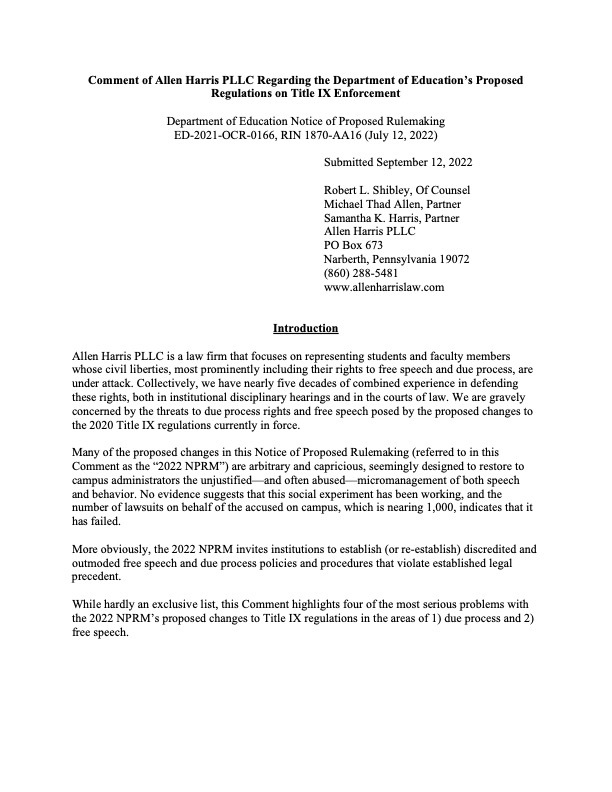
On Monday, Allen Harris submitted a comment on the Department of Education’s proposed new Title IX regulations. The proposed regulations would undo many of the changes that went into effect in 2020 when the Department of Education issued Title IX regulations that protect due process and free speech protections for students at colleges and universities.
Allen Harris’ comment in full can be found at the bottom of this page. We chose to highlight four particularly alarming new provisions (though they are hardly the only problems).
One of the primary concerns we highlighted is that the proposed regulations would once again allow schools to decide campus cases using a “single investigator” model that denies students a hearing with cross-examination – rights that courts around the country have already ruled are essential to protecting the rights of the accused and survivors both and, most importantly, protecting the integrity of the process used to decide students’ fate.
We also highlighted how the proposed regulations employ a broad definition of “sexual harassment” that would allow universities to punish students for speech that is protected by the First Amendment, putting students and faculty at risk merely for discussing on campus what they are free to discuss off campus. In particular, the new rules emphasize that subjective feelings may be enough to justify accusations and discipline. This means that students could face discipline for speech that someone finds subjectively offensive, regardless of whether that offense is reasonable. Furthermore, the right to free expression is not limited by whether someone, somewhere, somehow might feel offended.
Allen Harris submitted this comment in the belief that the protection of these rights helps everyone. We represent both complainants and respondents in campus Title IX cases, and we believe that free speech and due process protections enshrined in the 2020 regulations benefit both sides. While some institutions are committed to fundamental fairness and the unbiased evaluation of evidence, it is our experience that when universities are given leeway to cut procedural corners, they do so. This trend is all the more obnoxious where campus administrators, and their attorneys, clothe their decisions in pseudo-progressive ideology, as if they have uniquely and suddenly now discovered that canceling centuries of tried and tested methods for doing justice are old-fashioned or somehow oppressive.
We submit this comment in the belief that fair process is and has always been the sole and slender guardrail against arbitrary authority. There should be no mistake that fair procedures protect both victims and the accused. We should not tear the guardrail down in the name of any political movement or in favor of any would-be privileged group.
To read the comment in full, simply click the image below.
